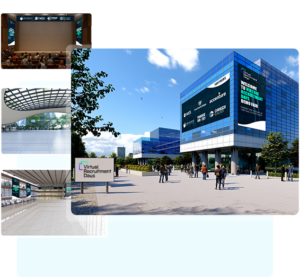Reaching and engaging audiences worldwide has never been easier. But what if you could seamlessly combine physical and virtual experiences to create a more inclusive, interactive, and scalable event? That’s exactly what hybrid events offer in 2025.
Hybrid events are no longer an emerging trend—they are the new standard. While in-person gatherings remain valuable, organizations now realize that going hybrid maximizes reach, engagement, and ROI. Many companies have yet to explore the full potential of this event model.
In this blog, we’ll guide you through:
- What hybrid events are and how they compare to virtual events
- The key benefits and challenges of hybrid event planning
- The ultimate features of a successful hybrid event
- 5 reasons why hybrid events are the future
- How to host a seamless hybrid event with Virtual Days
Let’s dive in!
What Is a Hybrid Event?
A hybrid event is a combination of a physical in-person gathering and a virtual event. Attendees can choose to participate onsite or remotely through an interactive virtual platform. This blended approach provides flexibility, allowing participants to engage from anywhere in the world.
Here’s how hybrid events work:
- A physical event is held at a venue while being live-streamed to remote audiences.
- Virtual attendees engage in real time via interactive tools like live Q&A, networking chats, and polling.
- Speakers, exhibitors, and sponsors can choose to participate physically or digitally.
Why Hybrid Events Are Taking Over
The data is clear:
- 73% of event organizers believe hybrid events will be the primary format moving forward.
- 86% of B2B companies now see virtual & hybrid models as crucial for event success.
- Hybrid events drive 3X more engagement than traditional in-person-only gatherings.
Hybrid events are not just a temporary trend—they are shaping the future of global event experiences.
Virtual vs. Hybrid Events: What’s the Difference?
While virtual and hybrid events share similarities, key differences set them apart:
Virtual Events (100% Online)
- Fully digital experience – No physical venue required.
- Global reach – Attendees can join from anywhere.
- Cost-effective – No venue, travel, or accommodation costs.
- Highly measurable – Track attendee engagement and analytics easily.
Hybrid Events (Physical + Virtual)
- Dual participation – Attendees can choose to join in person or online.
- Greater engagement – Combines face-to-face interaction with digital networking.
- Increased sponsorship opportunities – Brands can engage both audiences simultaneously.
- Best of both worlds – Offers a more inclusive, accessible, and immersive experience.
For companies that want to expand their event’s reach while maintaining the energy of live interactions, hybrid is the answer.
The Pros and Cons of Hybrid Events
Pros of Hosting a Hybrid Event
- Increased Attendance – Reach both onsite and remote participants, doubling your audience.
- Higher Engagement – Live Q&A, breakout sessions, and networking tools create an interactive experience.
- Global Reach, Local Feel – Hybrid events allow international audiences to participate without traveling.
- Sustainability & Cost Savings – Fewer flights, hotels, and venues = lower carbon footprint & reduced costs.
- Better ROI for Sponsors & Exhibitors – Hybrid events provide more visibility and higher audience participation.
Cons of Hosting a Hybrid Event
- More Planning Required – Managing both physical & virtual elements can be complex.
- Technical Challenges – Ensuring seamless live streaming & connectivity is critical.
- Coordinating In-Person & Remote Audiences – Engagement strategies must be balanced to avoid favoring one group over the other.
With Virtual Days, these challenges are easily overcome using expert guidance and seamless technology.
How to Host a Successful Hybrid Event
Organizing a hybrid event requires the right tools, strategy, and technology. Here’s your step-by-step guide:
Choose the Right Hybrid Events Platform
A feature-rich virtual event platform is key to success. Virtual Days provides:
- Custom-branded virtual venues (exhibit halls, auditoriums, networking rooms).
- Live streaming & on-demand sessions for remote attendees.
- Real-time engagement tools (live chat, polls, Q&A, breakout rooms)
Plan a Seamless Attendee Experience
Make sure onsite and virtual attendees get an equally engaging experience.
- Offer interactive networking opportunities for both audiences.
- Use event gamification (leaderboards, scavenger hunts) to keep engagement high.
- Provide personalized content for different attendee segments.
Create an Effective Hybrid Event Registration System
Pro tip: Hybrid events require separate registration processes for in-person and online attendees.
- Use a platform that tracks engagement, ticketing, and attendee preferences.
- Offer different ticket tiers (e.g., VIP onsite, virtual-only access).
Maximize Sponsorship & Branding Opportunities
Sponsors love hybrid events! They get:
- Physical & digital brand exposure (banners, booths, digital ads).
- Sponsored sessions & giveaways for both live & virtual attendees
- Detailed analytics to measure ROI.
Ensure High-Quality Live Streaming & Production
Hybrid events rely on flawless technology. Make sure to:
- Use HD cameras & professional audio for crisp sound & video.
- Have a technical support team available during the event.
- Offer real-time troubleshooting for attendees.
5 Reasons Why Hybrid Events Are the Future
1.Take Your Event Global – Remove geographical barriers and scale your event worldwide.
2. Expand Networking Opportunities – Attendees engage both in-person & online with AI-powered matchmaking.
3. Gain Actionable Event Insights – Track real-time analytics & attendee engagement.
4. Increase Flexibility & Accessibility – Offer on-demand content for attendees who can’t join live.
5. Reduce Environmental Impact – Hybrid events support sustainability initiatives by cutting travel emissions.
Hybrid Events Are Here to Stay
Hybrid events are the perfect blend of in-person and virtual experiences, making them the most effective event format for 2025. Whether you’re hosting a conference, trade show, job fair, or corporate event, hybrid is the way forward.
With Virtual Days, you get the best-in-class hybrid event platform designed for engagement, scalability, and seamless execution.






